Indo-Lanka Accord of 29 July 1987 does not restrict Sri Lanka’s use of its own Ports or Trinco Oil Tanks
Posted on August 10th, 2022
Shenali D Waduge
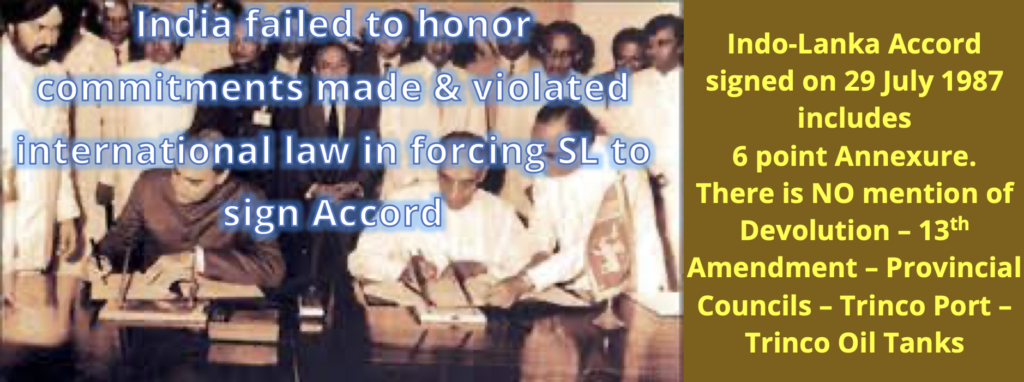
The Indo-Lanka Accord was signed on 29 July 1987 in Colombo with Prime Minister Rajiv Gandhi signing on behalf of India & President J R Jayawardena signing on behalf of Sri Lanka. There are 6 points annexed to the accord. The text of the Accord & the 6 point annexures are what makes the Indo-Lanka Accord. The letter drafted by PM Rajiv Gandhi is not part of the Accord though it was signed on the same day. This letter does not even mention the name Indo-Lanka Accord. Therefore, no one can use the contents of the letter & claim that to be part of the Indo-Lanka Accord.
The Trinco Port & Trinco Oil tanks as well as reference to foreign broadcasting (Voice of America) is mentioned only in the letter by Rajiv Gandhi. The Accord only mentions the 6 point annexures. There is no mention of letters being part of the Accord. Thus Sri Lanka is not bound by the contents as these are signed between 2 former heads of State who are now no more.
INDO-LANKA ACCORD
The accord claimed to ‘establish Peace & Normalcy in Sri Lanka’ both of which did not happen
The agreement attached utmost importance to nurturing, intensifying & strengthening the traditional friendship of India & Sri Lanka” – none of the above also happened.
The agreement acknowledged” the need to resolve the ‘ethnic” problem and the consequent violence”and for the safety, well-being & prosperity of people belonging to all communities in Sri Lanka”. The all communities in Sri Lanka” is often misplaced as reference is always with regard to the welfare of one community only.
The Agreement further breaks down the objectives
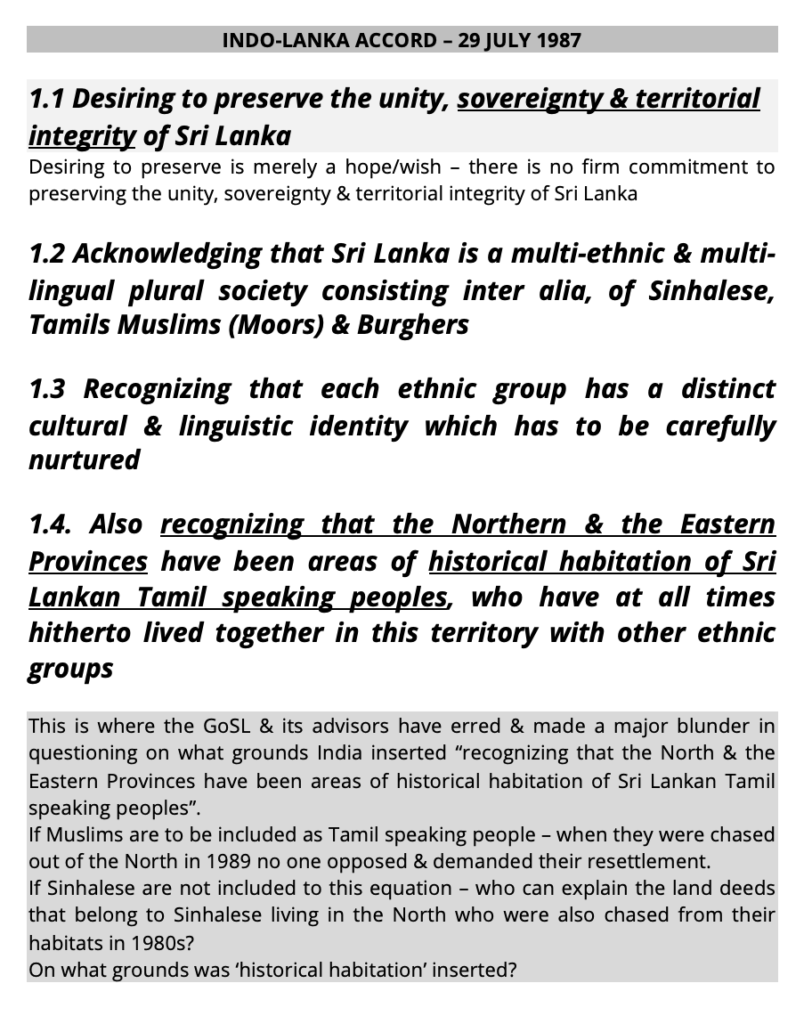
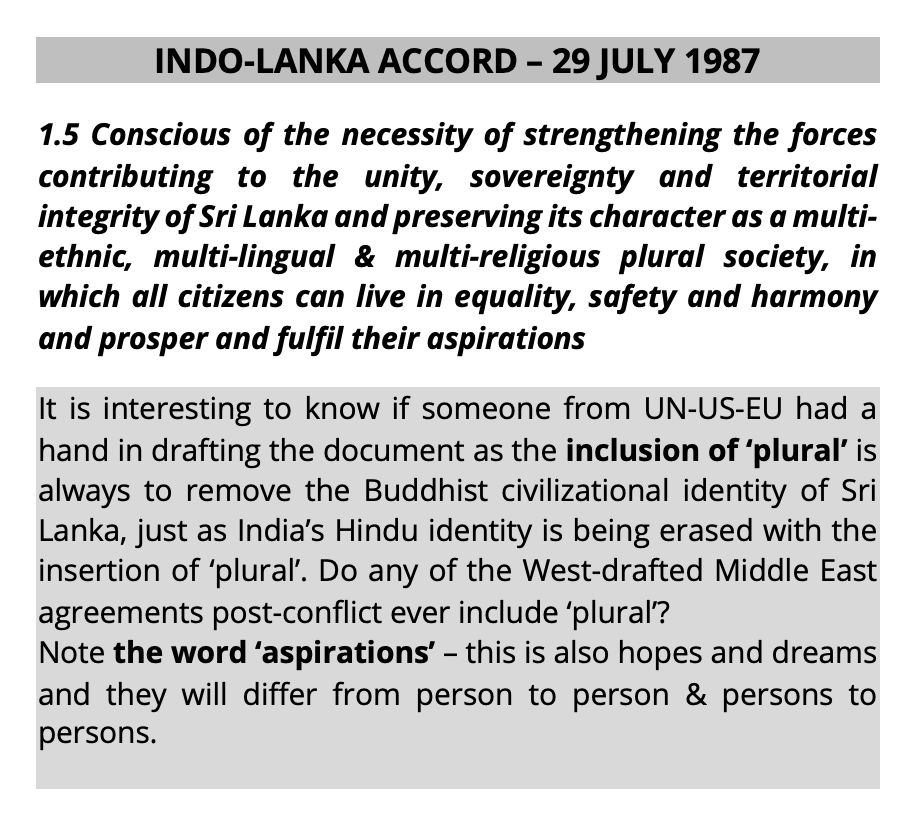
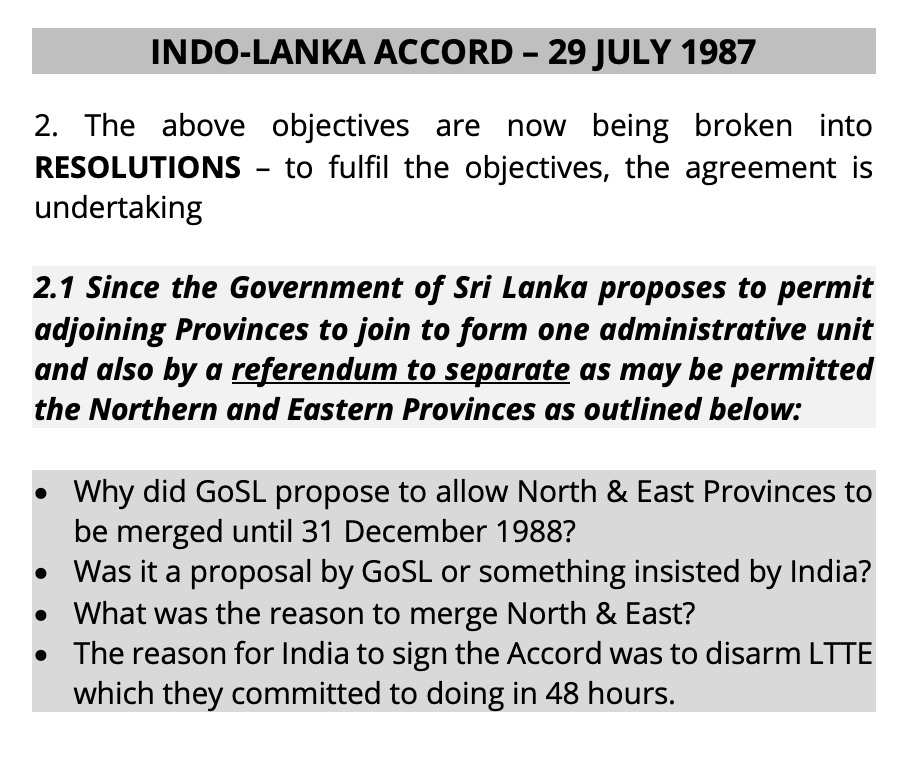
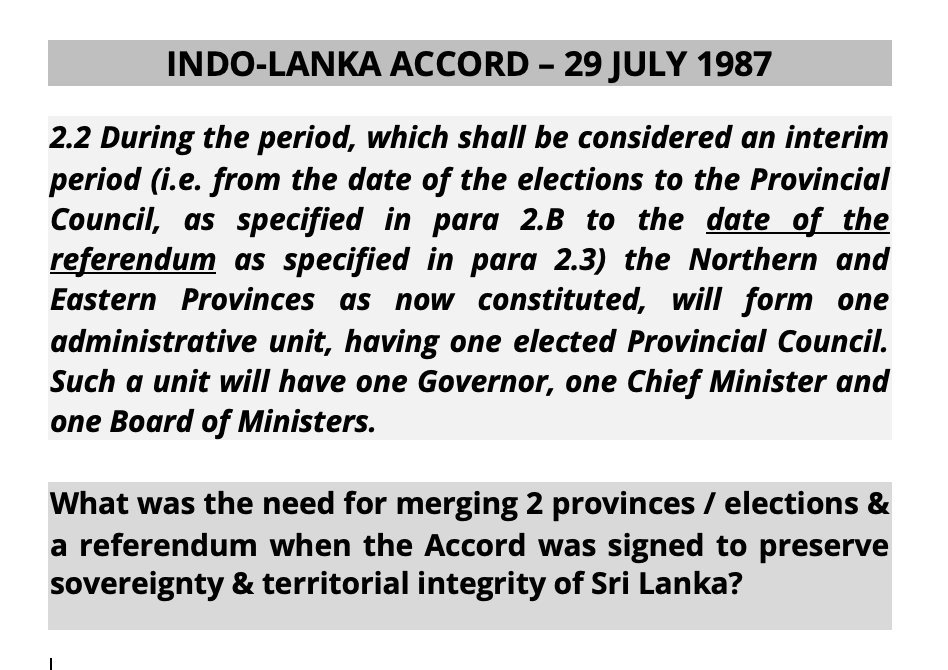
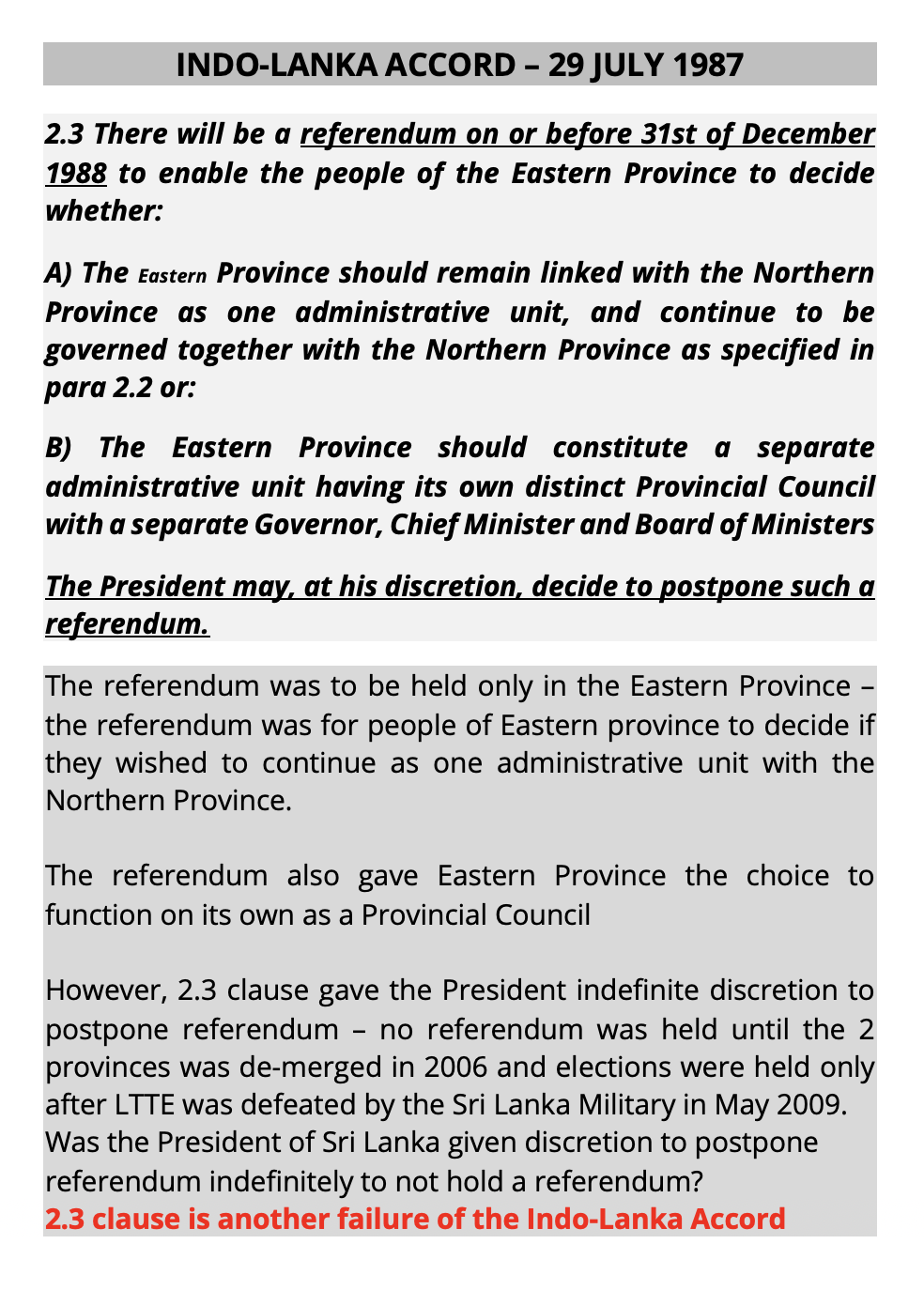
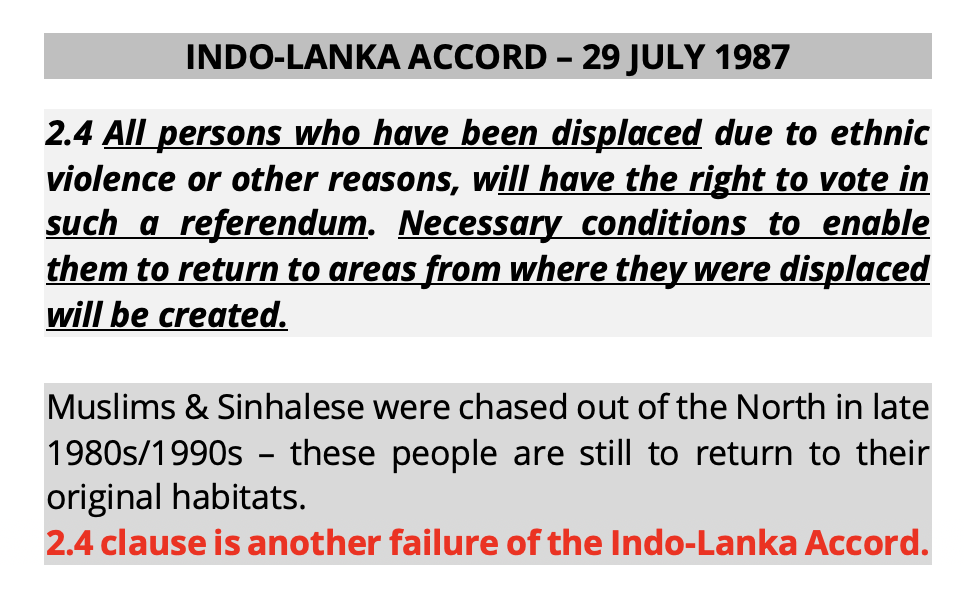
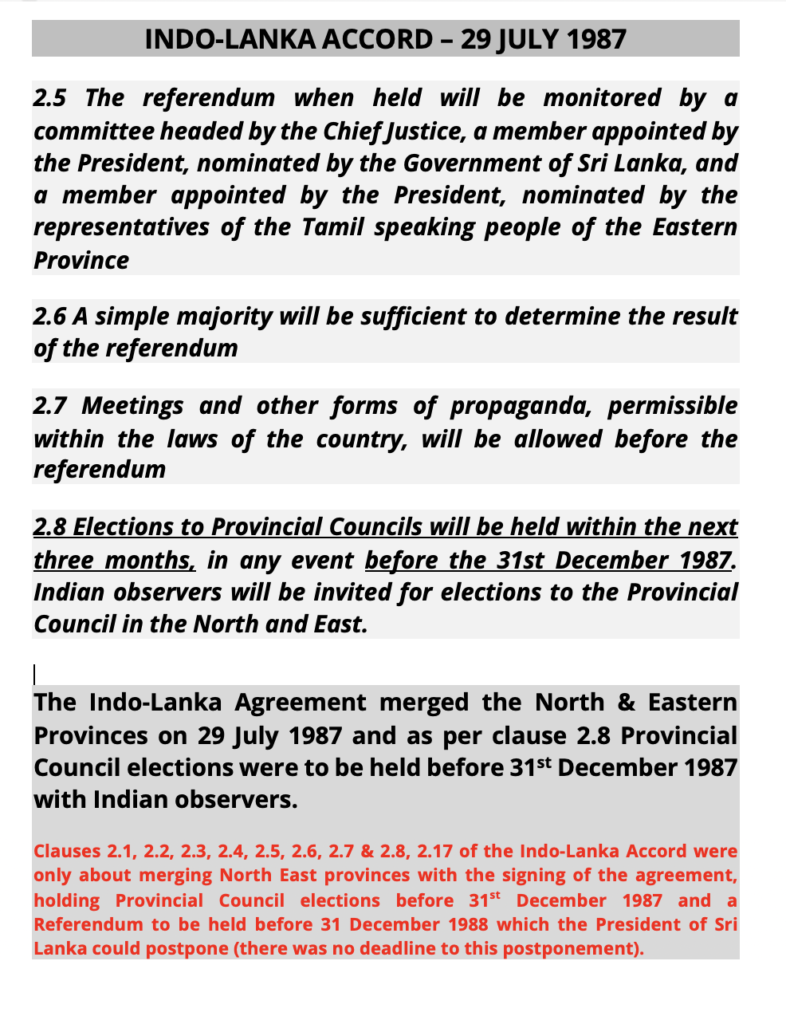
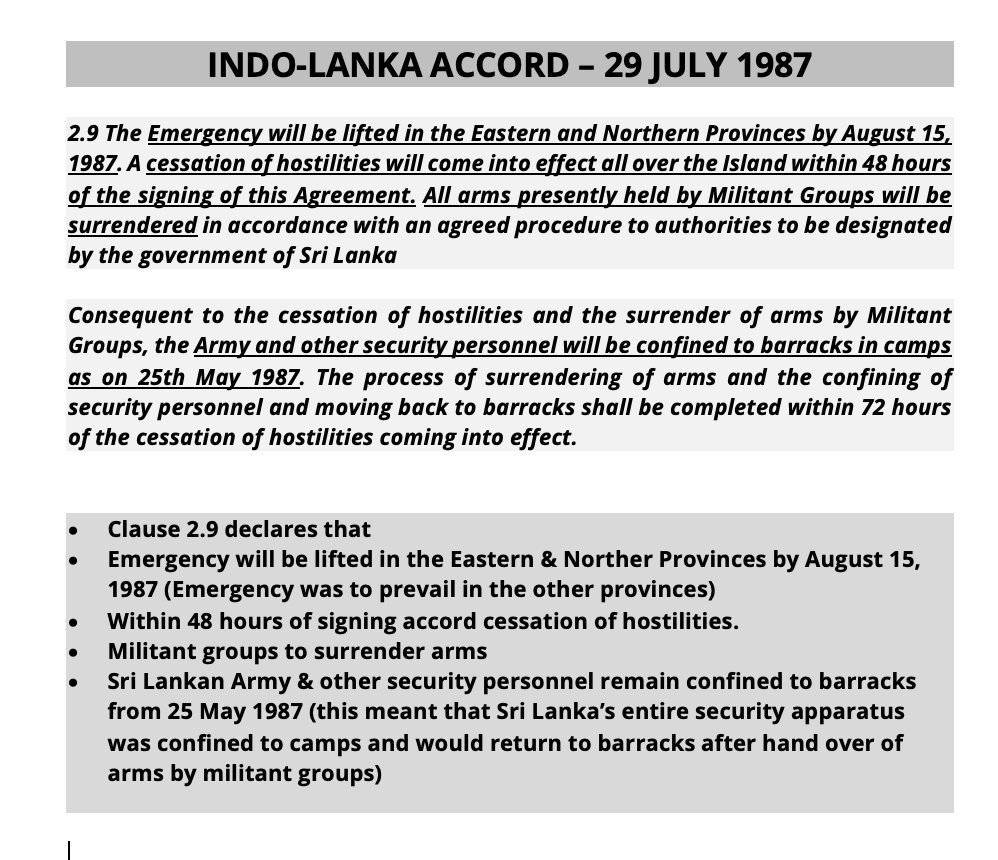
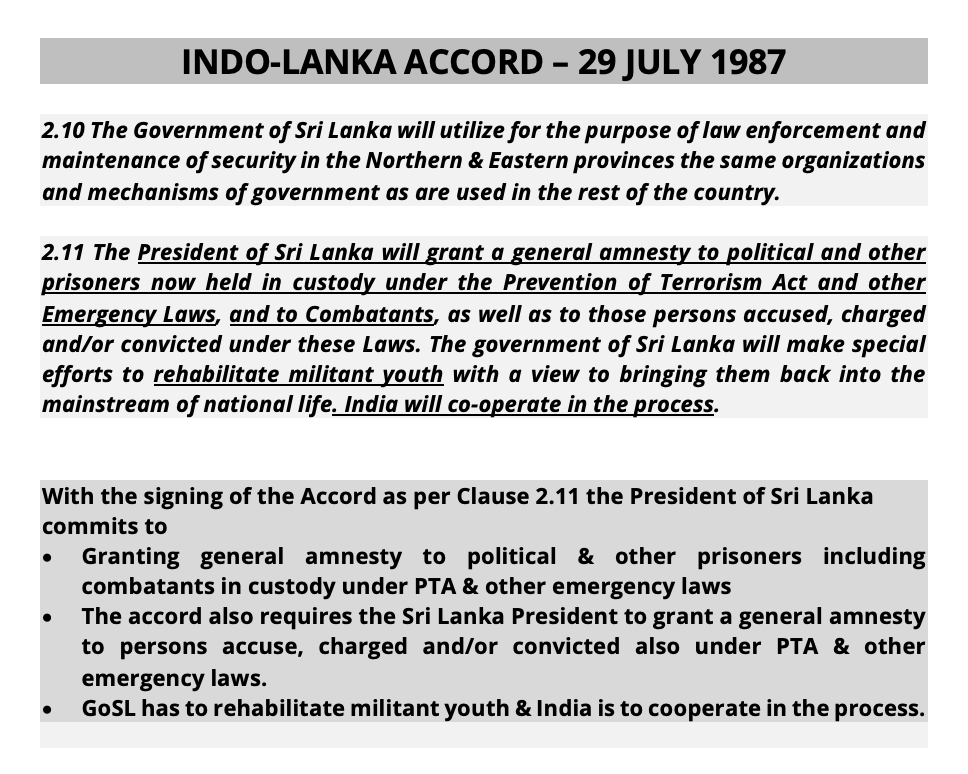

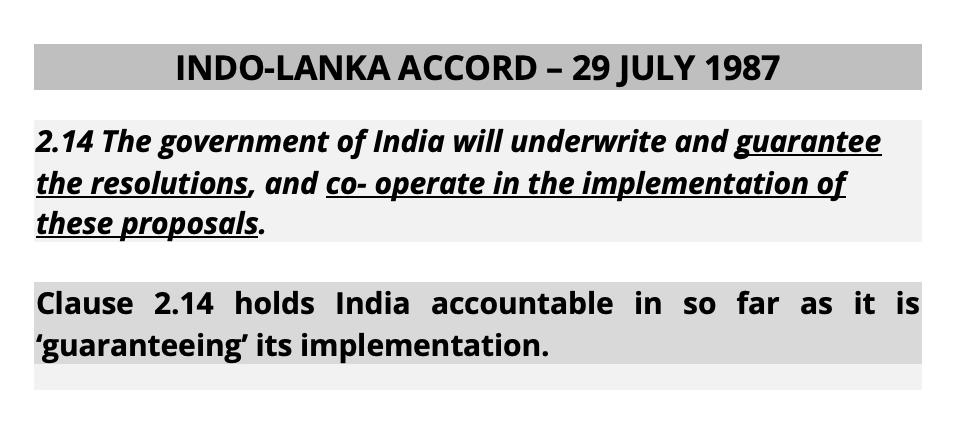
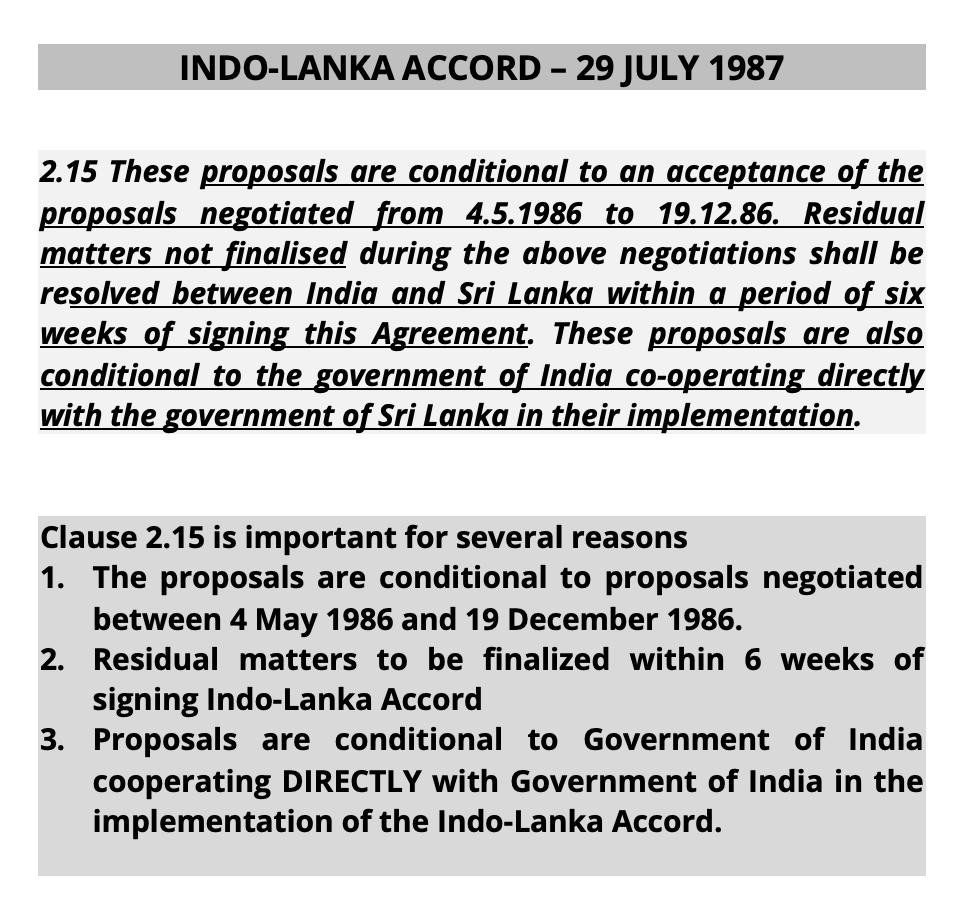
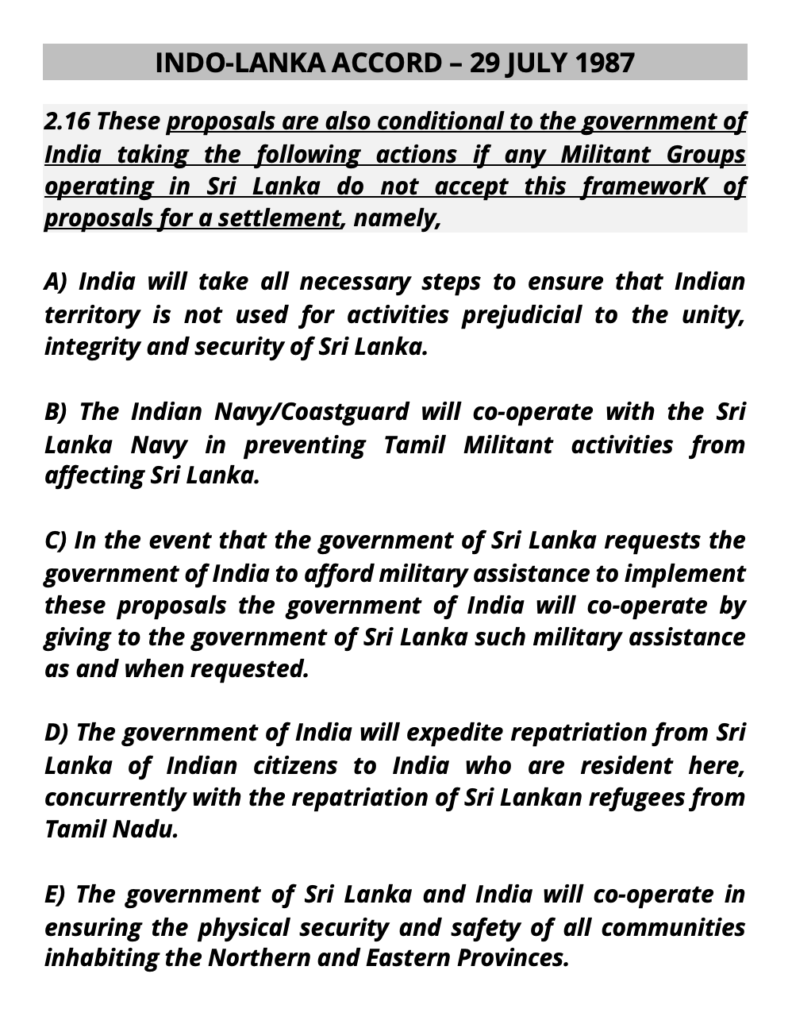
Clause 2.16 sets further actions by the Government of India if Militant Groups do not accept the outlined framework of proposals (NE merger/NE Elections/Referendum)
India thus commits to
2.16 – CONDITION A:
Did India ensure Indian territory is not used for activities prejudicial to the unity, integrity & security of Sri Lanka?
No
LTTE continued to use Tamil Nadu as its logistics hub with tacit assistance by even the TN state govt
2.16 – CONDITION B:
Did Indian Navy/Coastguard cooperate with Sri Lanka Navy to prevent Tamil militant activities against Sri Lanka?
No
LTTE boats were plying to and from Sri Lanka’s North to Tamil Nadu
2.16 – CONDITION C:
India commits to provide military assistance to implement proposals upon request of Government of Sri Lanka
President J R Jayawardena used 2.16 C) to request Indian Peace Keepers to disarm LTTE
2.16 – CONDITION D:
Indian Govt commits to expedite repatriation of Indian Citizens in Sri Lanka to India while repatriating Sri Lankan refugees from Tamil Nadu.
Repatriation of Indian citizens living in Sri Lanka has not been done.
2.16 – CONDITION E:
Both Governments to cooperate to ensure physical security & safety of all communities living in North & Eastern Provinces.
This clause also failed as IPKF began killing and raping people of all communities as they could not identify who was who and majority of IPKF soldiers did not speak Tamil.
IPKF killings and rapes have yet to be investigated.
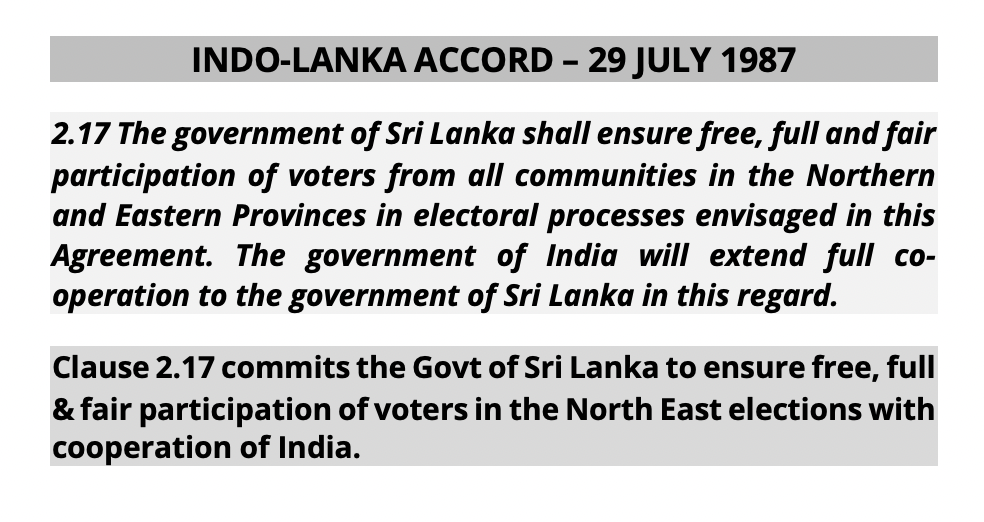
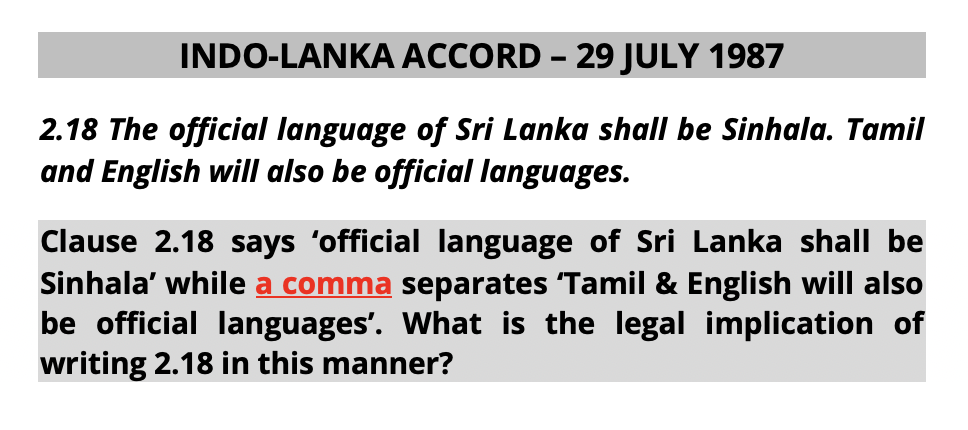
This Agreement and the Annexures thereto shall come into force upon signature
Clause 3 stipulates that the above clauses plus the annexures will come into effect upon signing of the Agreement on 29 July 1987
In witness whereof we have set our hands and seals hereunto.
Done in Colombo, Sri Lanka, on this the twenty ninth day of July of the year one thousand nine hundred and eighty seven, in duplicate, both texts being equally authentic.
Junius Richard Jayawardene, Rajiv Gandhi,
President of the Prime Minister
Democratic Socialist Republic of the Republic of India
of Sri Lanka
THE ANNEXURE
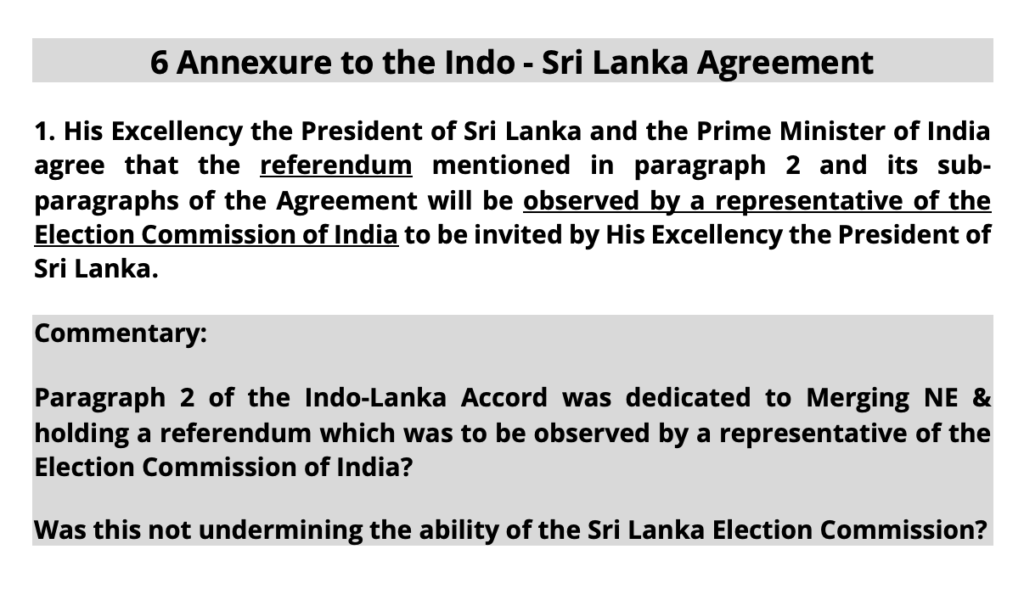
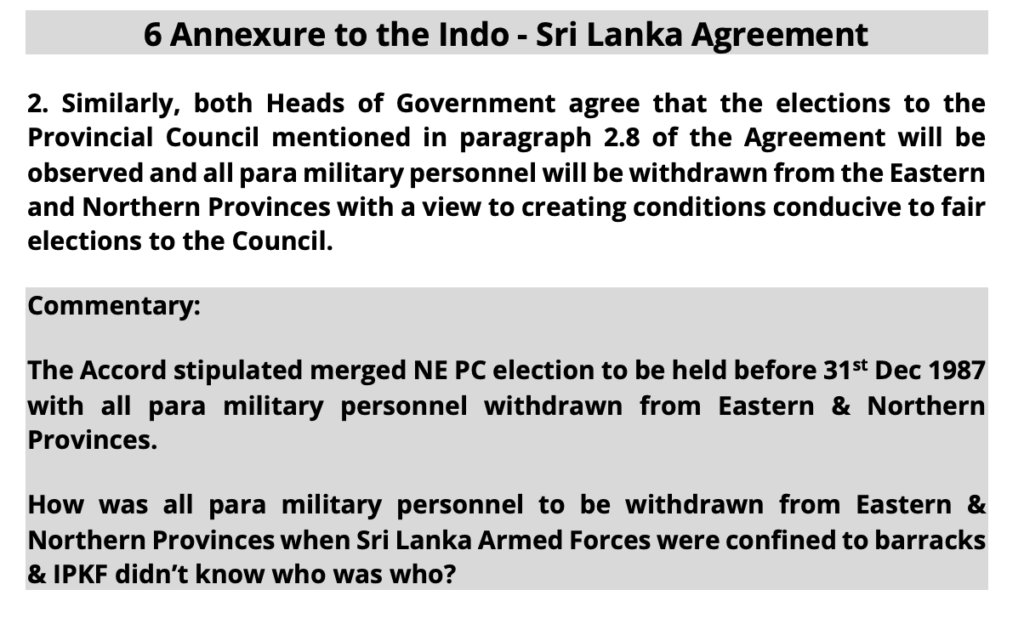

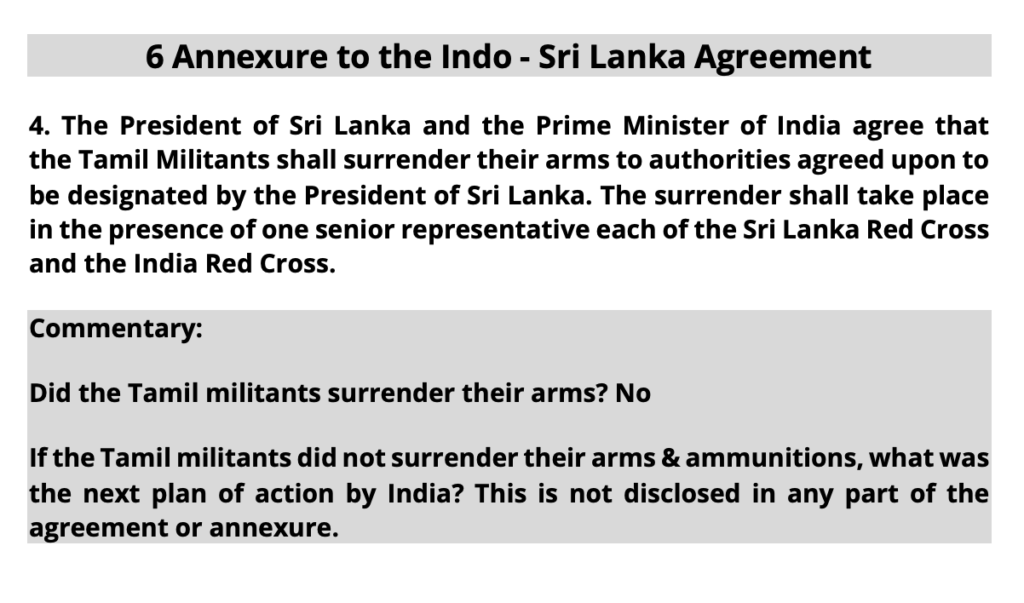


Next we come to the controversial letter which is not part of the Accord or Annexure of the Accord
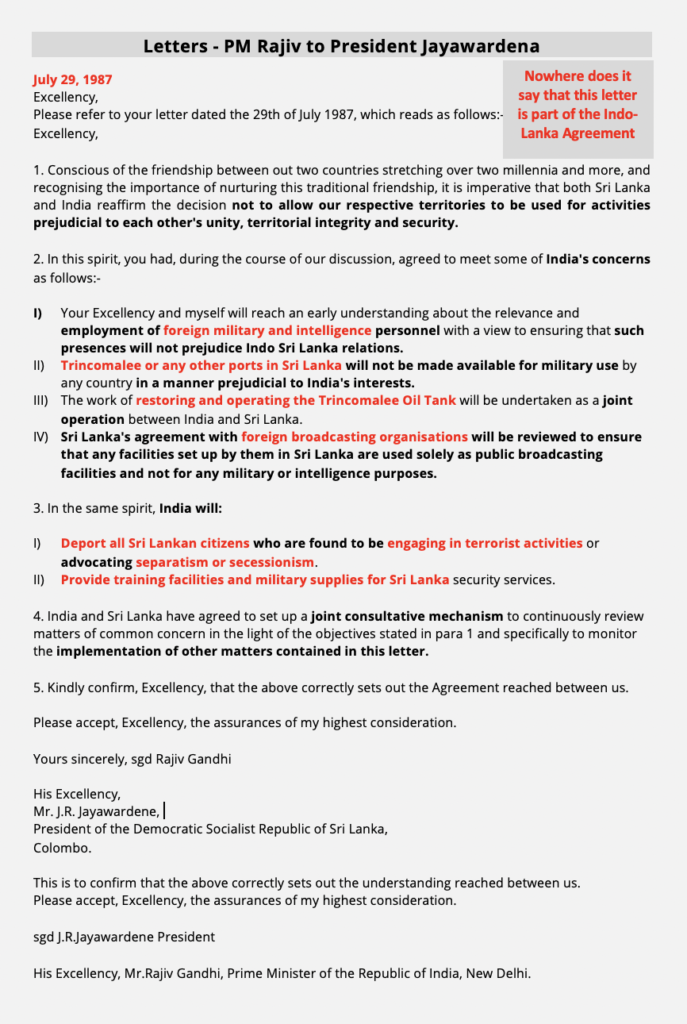
PM Rajiv Gandhi’s letter to President Jayawardena written on the same day as that of the Indo-Lanka Accord signing – 29 July 1987
Highlights the following
Joint agreement:
- Not allow territories of both nations to be used for anything that impacts the unity, territorial integrity & security of either country
Sri Lanka makes 4 commitments (addressing India’s concerns) subject to Sri Lankan President confirming commitment via response to PM Rajiv’s letter which is not available.
- Foreign military & intelligence personnel to not prejudice Indo-Lanka relations
- Trinco or any other port in Sri Lanka to be given for military use by any country against India’s interest
- Restore & operate Trinco Oil Tank as a joint operation between India & Sri Lanka
- Sri Lanka’s agreement with foreign broadcasting organizations reviewed are only used for public broadcasting & not military or intelligence purposes.
India’s commitment
- Deport all Sri Lankans in India who are engaging in terrorist activities or advocating separatism or secessionism (India did not fulfil this)
- Provide training & military supplies for Sri Lanka security services
India & Sri Lanka to set up a joint consultative mechanism to review matters & monitor implementation.
If the letter is not part of the Accord, Sri Lanka is not bound to commit to any contents of this letter
- Eternal use of India’s security concern”
- Giving Trinco Port to any party & not requiring to seek ‘permission’ of India
- Not bound to operate Trinco Oil Tank as a Joint venture (an error that successive Sri Lankan govts continue to make – SL first leased 99 oil tanks to India for 35 years in 2003)
Noteworthy also is that there is not a line that mentions creating PC system & 13th amendment or devolution in the Indo-Lanka Accord. The Agreement makes reference to North East Provinces and merging them & holding elections & referendum in them. The UN & so-called international community must take out the document & read line to line of it.
So 13th amendment is separate to the Indo-Lanka Accord although that too was forced upon Sri Lanka. Devolution of Sri Lanka via constitutional changes under duress as sufficient evidence that India would take military action is available via threats by Indian envoys to Sri Lanka’s envoy. This is a violation of Article 2(4) of the UN Charter refrain …. from the threat or use of force against the territorial integrity or political independence of any state”.
India further committed aggression against a friendly state by the measly food drop to only one community, breaking India’s claim that it is concerned for all communities of Sri Lanka.
India has also violated Article 51 of the Vienna Convention of the Law of Treaties
expression of a state’s consent to be bound by [a] treaty which has been procured by coercion of its representative through acts or threats directed against him shall be without legal effect.
India has also violated Article 52 of the same Convention
a treaty is void if its conclusion has been procured by the threat or use of force in violation of the principles of international law embodied in the Charter of the United Nations.”
Moreover, India committed to 5 clauses under the Indo-Lanka Accord. India did not honor any of them. This is a violation of Pacta Sunt Servanda’ (pacts are meant to be honored for agreements to be valid) If India did not honor the pact, that pact is no longer valid under this legal maxim.
Indo-Lanka Accord was signed in 1987 – the political dynamics of 1980s or 1990s does not exist presently. India was a closed economy upto 1994. India was never under US orbit during this time. The foreign broadcasting service referred to in Rajiv Gandhi’s letter to President JR is Voice of America station. Today, India is now partners with US and India has no issue in US military ships landing in Sri Lanka or Sri Lanka signing ACSA making use of Sri Lanka’s airports & ports. What if India & US suddenly do not see eye to eye – will India pluck out the Indo-Lanka Accord again while ignoring it when India sees fit? These double standards is unacceptable in diplomatic relations.